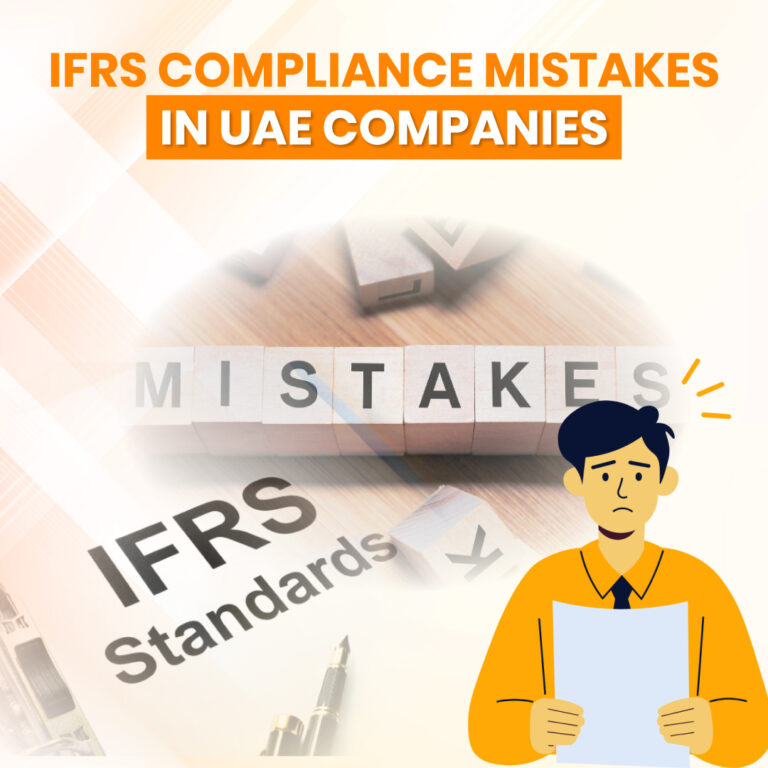ARE YOU OVERLOOKING THE MOST FREQUENT IFRS MISTAKES IN THE UAE?”
The UAE is well-focused on following IFRS standards, as the government has mandated that all organizations, companies, and businesses in the region adhere to International Financial Reporting Standards (IFRS). This compulsion has proved favourable for the UAE’s diverse business landscape over the years, helping companies expand and attract more investors. However, IFRS compliance in the UAE has been followed for years; now they have some very skilled professionals and acceptance for these standards in the country’s financial sectors. Yet despite all this experience and skilled talent, businesses and companies tend to make some common mistakes in IFRS in the UAE.
To avoid these mistakes in the future and shape an error-free financial sector in the UAE, finance aspirants and professionals must identify the loopholes or mistakes that organizations usually make in IFRS compliance in the UAE. To help financial aspirants understand these mistakes, we brought forward this blog, through which you can get all the relevant insights and build an error-free finance future.
MISTAKES MADE IN IFRS COMPLIANCE IN THE UAE:
Companies, Businesses, or Finance professionals usually make mistakes in IFRS compliance in the UAE; professionals should identify and study them to avoid such errors in the future.
1: INCORRECT REVENUE RECOGNITION:
Companies that still ain’t using the IFRS five-step model, rather still relying on the traditional practices, face common errors in revenue recognition. The errors that occur in a company because of such a mistake are misinterpreting multiple performance obligations as a single, unadjustable for variable considerations, and most importantly, recognizing the revenue before transferring the control to the customer, etc.
2: WEAK FINANCIAL INSTRUMENTS CLASSIFICATION:
Companies typically fail to efficiently classify the financial instruments, which means that the businesses in the UAE commonly struggle with working with outdated ECL models, misclassifying investments & loans, inability to perform well with ECL (Expected Credit Loss) assessments, etc. When fixing the errors in the IFRS compliance in the UAE, finance professionals need to at least ensure the company’s financial instruments classification is strong and uncompromised.
3: POOR FAIR VALUE MEASUREMENT:
Usually, the companies or businesses in the UAE are not good at fair value measurement because of which they end up making some of the common mistakes, such as working with outdated property valuation, inability to make adjustments with valuations, and assumptions or insufficient disclosures on valuation techniques, etc. Professionals who aim to reshape the finance sector by focusing on the IFRS compliance in the UAE and fixing the common mistakes made during the process should ensure the business focuses on efficient fair value measurement.
4: IMPROPER LEASE ACCOUNTING:
Companies or businesses in the UAE usually face issues in proper lease accounting; the common mistakes that add to the improper lease accounting are keeping leases on the balance sheet, no update in index-based changes or lease liabilities, and the wrong selection of discount rate. etc. If a finance professional manages to control these mistakes, it will surely bring a very positive change in the business and financial landscape of the UAE.
CONCLUSION:
Indeed, International accounting standards are a core part of the UAE’s financial, accounting, and business landscape; organizations that need to legally operate must follow International Accounting Standards in the UAE. IFRS compliance in the UAE, however, is quite essential and highly regarded in the region, yet there are some typical mistakes that businesses or professionals end up making. These common mistakes include improper lease accounting, poor fair value management, incorrect revenue recognition, and weak financial instruments classification. If you want to fix the mistakes made in IFRS in the UAE, now you know some of the common mistakes.
FREQUENTLY ASKED QUESTIONS (FAQs)
Q1: Who is the best tutor for IFRS certification in Dubai?
Ans: One of the best tutors for IFRS certification in Dubai is Sir Mustafa Mirchawala; he’s been offering his global teaching services in Mirchawala’s Hub of Accountancy for over a decade. His in-depth knowledge and skills in accounting and financial areas are commendable, which help students to climb the ladder of academic success.
Q2: Can I do an IFRS diploma in the UAE virtually?
Ans: Yes, students are allowed to take the IFRS diploma in the UAE through distant, virtual learning; all they need to do is get themselves enrolled in a well-recognized course with a reputed tutor.
Q3: Do finance professionals need to master IFRS in the UAE to survive in the practical world?
Ans: Yes, finance professionals must have expertise in IFRS if they want to survive in the financial sector of the UAE, as these standards are mandatory for companies and businesses in the region.





